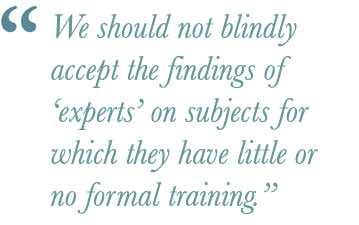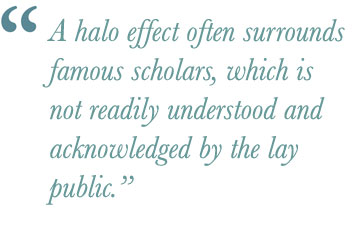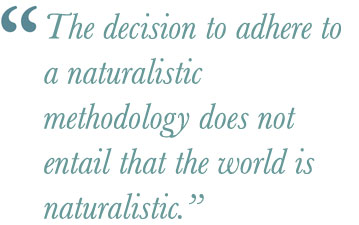
By David P. Diaz, Ed.D.
The “high stakes” world of “publish or perish”1 has become increasingly complex and exceedingly competitive. In this type of system, one’s advancement, indeed one’s very job security, is dependent on a continuing cycle of contributing to one’s academic discipline through publication and through the ancillary requirements attendant to that task. I have always admired those who can continue to devote themselves to this sometimes tedious and demanding process. Peter Lawrence (2016) has candidly pointed out the pressure such a system places on individuals: “The number and locations of our publications are counted up…and then used to rank us, one against another.”2
In my opinion, those who succeed in meeting their employers’ publication goals have shouldered a tremendous psychological burden, not to mention mounds of administrative drudgery. But they have also earned the right to be called “scholars.”
It takes many fields of knowledge to help us learn about the world. Those who garner specialization in one area may lack a clear understanding of other critical disciplines of study. This is especially true of Ph.D. candidates and graduates. An often-heard quip is, “those who earn Ph.D.’s, tend to learn more and more about less and less.” In other words, the specialized focus of high-level academics can often lead to a myopic view of the world. Those with a constricted educational focus, while certainly having expertise in their personal microcosm of academia, tend to see all questions and possible answers through the same narrow lens. In doing so, they may miss a broader perspective of essential issues that lie outside their field of expertise.
When Experts Aren’t
We see many books published by ‘experts’ in their own disciplines who are determined to pontificate on subjects that are not (i.e., part of their discipline of expertise). I’m not saying that this is necessarily a bad practice or that the authors haven’t spent the necessary time and effort to understand all the issues. As a matter of fact, I will be the first to say that I am not an expert in many of the fields of discipline in which I write. Nevertheless, I would still say that when writers attempt to dissect matters outside of their fields of expertise, we should all be cautiously scrupulous in examining their conclusions and reasoning. Indeed, we should not blindly accept the findings of ‘experts’ when they write on subjects in which they have little or no formal training, and I include myself in this caveat. Instead, we should subject their thoughts and words to a healthy dose of skepticism and scrutiny. I would especially recommend that one diligently look up the references provided by each author to see if they are getting their facts straight.

In the past decade or more, we have regularly seen atheists weigh in on topics like God’s existence and religions’ problems. Richard Dawkins, Sam Harris, Daniel Dennett, and Christopher Hitchens, among many others, have represented “The New Atheism.”3
In his numerous books designed to disparage all forms of religion, Dawkins—an evolutionary biologist—appears to fancy himself a theologian and philosopher, even though he is neither. Dawkins makes multiple attempts to clear up our “delusion” that God exists. To do so, he traverses the domains of philosophy and theology, in which he appears to have little formal training.
The late Christopher Hitchens was also not an expert in theology or philosophy. Hitchens was an essayist, journalist, and columnist who regarded all religions as false and harmful. He considered himself an “antitheist,” albeit with little theology in his educational background. Although Hitchens was also a self-styled philosopher of religion and theologian (in that he had so much to say on these topics), in reality, he was neither. His lack of expertise in these fields became readily apparent when he debated professional philosopher and theologian William Lane Craig.4
Sam Harris is an intelligent, articulate, and engaging personality who regularly debates Christians and other theists. Harris earned a B.A. in philosophy and a Ph.D. in cognitive neuroscience. Like the others, he spends much time telling theologians that they are mistaken about their theologies and biblical interpretations, even though they may have a formal education in both disciplines, while Harris does not.

Daniel Dennett is the only one of the so-called “Four Horsemen of Atheism” whose advanced degree is in philosophy. Dennett is probably the widest read of the bunch, and yet he, too, lacks an advanced degree in theology. The main problem with his book, Breaking the Spell (2006), is that he lumps all religions together and then tries to explain religion as a natural phenomenon. It’s a fool’s errand to think you can convincingly discuss the drawbacks of religion, primarily because there is no such thing as a single “religion.” There are hundreds of religions, each with its distinct doctrines, dogma, and sacred texts. Any such discussion has to be laboriously broken down into the parts relevant to that single religion. But Dennett does not do that. To be fair, Dennett provides a disclaimer in the Preface: “Let me begin with an obvious fact: I am an American author, and this book is addressed in the first place to American readers.” He uses this statement to explain why he focuses the content of his book on “Christianity first, and Islam and Judaism next.” He concludes: “I simply do not know enough about other religions to write with any confidence about them.” And yet, he mentions Hinduism six times, Buddhism five times, Taoism twice, Confucianism twice, as well as a smattering of others, notably Talibanism, which he also considers a sect of the religion of Islam.
Rest assured, I am not saying that one needs an advanced degree in a particular discipline to speak truths about said discipline. Truth is truth, no matter who speaks it and regardless of their training. However, I have noticed that a certain “halo effect”5 often surrounds famous scholars, which is not readily understood and acknowledged by the lay public. My simple warning is that controversial conclusions by non-experts in a field should be considered as such and should be scrutinized accordingly. Just because one is a recognized expert in one field does not automatically make them an expert in another. Thus, we should follow the New Testament maxim: “Test all things; [and] hold fast what is good” (1 Thess. 5:21 [NKJV]).
The Impact of Science
Most of the current crop of atheists rely heavily on the ability of science to determine truth. While the discoveries of science during the 20th century and beyond have been breathtaking and the results wildly impressive, I have never been persuaded that the scientific method (i.e., methodological naturalism6) can lead us into all truth. Appealing to methodological naturalism to guide our scientific endeavors is perfectly legitimate. However, believing that the entirety of what can be known about the world can only be known through the naturalistic method is a matter of faith. Empirical science, properly delineated, makes (should make) no comment on metaphysical realities. Such realities are the subject of religion, philosophy, and theology. Controversial questions like the origin of the physical universe, the apparent existence of non-spatial and non-temporal realities (e.g., rational thought, numbers, soul, spirit), the apparent existence of free will, and the existence of God are metaphysical questions, not scientific ones.
While it is certainly appropriate to circumscribe scientific study to the realm of natural laws and causes, the decision to adhere to a naturalistic methodology does not entail that the world is naturalistic. At best, science can only present its observations regarding the physical world in which all conclusions of significance must be considered provisionally true, at best.
Unfortunately, way too many scholars and even more laypersons are so enamored with science that they place an arbitrary restriction against knowing anything outside of what is attainable through scientific methodology. This philosophy is called “scientism.” Scientism is an excessive belief in the power of scientific knowledge to explain everything. Unfortunately, by following a naturalistic methodology, sciences can neither affirm nor deny metaphysical causes because, by their very nature, the sciences are limited to propositions about the physical world.

The sciences typically rely on empirical investigation, which means that all scientific data is observable (to our senses), testable, and repeatable. While the empirical sensory mode helps us learn about physical objects in the universe, there are other modes of awareness that enable us to grasp abstract and non-physical entities. For example, there exists an introspective mode for awareness of our own consciousness and an intellective mode for apprehending meanings (e.g., other entities that are neither temporal nor spatial). If other modes of awareness exist (and I believe they do), then other methods of obtaining knowledge can be developed around them. Thus, empirical science, while appropriate for discussing some questions, is not appropriate for others. In my opinion, scientists can work together with philosophers and theologians to tackle the perennial problems that have compelled our thinking since the beginning of conscious thinking.
Of course, I am not attempting to denigrate the integrity of scientifically gained knowledge. Nor am I attempting to downplay the remarkable scientific achievements of the past century and beyond. Instead, I hope to balance our expectations of science with an understanding of the limits inherent in its methodology. The rational person would do well to be continually aware of science’s limitations and the need for science to cooperate with other disciplines—namely philosophy and, yes, even theology.
Conclusion
The disciplines of science, philosophy, and theology can work together to answer, if possible, the important metaphysical questions of our time. But very few people have expertise in all areas. Therefore, if scientists, philosophers, and theologians (and perhaps other disciplines and subdisciplines) can effectively collaborate, they may together capture the best possible understanding of our world. These domains of knowledge can exist harmoniously as long as none claim infallibility. The world’s realities are far too diverse in structure and behavior to be exhaustively identified, quantified, elucidated, or circumscribed by any one domain of knowledge.7
About the Author
David P. Diaz, Ed.D., is an independent researcher, retired college professor, and publisher of Things I Believe Project. His writings have spanned the gamut from peer-reviewed technical articles to his memoir, which won the 2006 American Book Award. Dr. Diaz holds a Bachelor’s and Master of Science degree from California Polytechnic State University, a Master of Arts in Philosophical Apologetics from Houston Christian University, and a Doctor of Education specializing in Computing and Information Technology from Nova Southeastern University.
Footnotes
- The “publish or perish” sector refers to institutions and organizations that have employee requirements for research and publication. The steepest requirements most often (but not always) exist at private non-profit universities (MIT, Harvard, Yale, Stanford, etc.). Other universities that have publication requirements are the public 4-year universities (University of Michigan, UCLA, etc.) and the state university systems (SUNY, CSU, etc.). Though the exact requirements may vary, almost all universities have research and publication requirements that are related to job status and advancement.
- Peter A. Lawrence has written an excellent summary of the factors that impede scientific research. This article can be found in the list of references and is titled, The Last 50 Years: Mismeasurement and Mismanagement Are Impeding Scientific Research (Accessed November 2, 2020).
- James E. Taylor, “The New Atheists”. Internet Encyclopedia of Philosophy, accessed Oct. 29, 2020.
- The reader is referred to a video of the debate between Craig and Hitchens on YouTube.
- A halo effect is “the tendency for an impression created in one area to influence opinion in another area” (Lexico dictionary, https://www.lexico.com/definition/halo_effect
- Historically, science has come to voluntarily limit its scope to the confines of the material (i.e., natural) world. This notion has expanded over the years to include not only material entities that are spatially extended but also fields and forces. In this sense, methodological naturalism is often referred to as physicalism. However, since methodological naturalism entails the implicit assumption that the world is made up exclusively of physical material and causes, all conclusions must be held provisionally and not as absolute truth.
- For my thoughts on the limits of science and the role of other disciplines in seeking and finding truth, see my article: “Seeking Truth: The Limits of Science and the Role of Philosophy and Theology.”